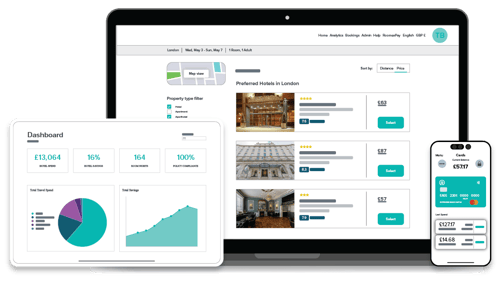These are supposed to be happy times, we’re told. We’re just coming out of a global pandemic and summer is in sight. Happier times ahead, right? Well yes, but then there’s the other side. The rising cost of living and working, the challenges that remain around post-covid travel, low levels of consumer confidence, and the uncertainty that comes with all of this.
If you’re tasked with the mammoth job of helping to reduce business costs, specifically the cost of business travel, you’ll want to read on.
The importance of business travel
While it would be easy to just simply reduce or remove the need for business travel, for businesses built around offsite projects like construction, engineering and retail, travel is a necessity. Whether it’s to visit a regional office for relationship building, attending an industry event, or to be present on site, there’s endless good reasons why post-covid travel is vital for businesses to function.
While it’s always good to be clear on what ‘necessary’ travel means, it’s equally as important to support business travel in the workplace. Not just because it’s valuable for relationships, but also for your bottom line. A study by Oxford Economics found that every dollar spent on business travel resulted in $12.50 in incremental revenue.
So then, if business travel is inevitable and necessary, what can be done to help combat the rising cost of business travel? Here’s a few thoughts…
Rail versus air travel
It can be no surprise that the cost of travel is rising, especially flying. In a BBC report, it was predicted that airfares could rise by as much as 54% in post-covid travel world.
At a time when consumers are ever-conscious about their global footprint, rail travel and public transport offers a far more sustainable way to travel, that is also far more affordable than taking to the skies. Plus, you may find that there’s greater flexibility with re-bookings in workforce travel.
Shared travel and rooms
Prior to the pandemic, room and car sharing was a popular way to reduce the cost of business travel. While this has not been encouraged over the past two years, perhaps the time has come to revisit this option?
However, businesses should only do so with employee wellbeing as a priority. This may mean reviewing policies to bring them in line with covid-safe procedures, such as creating ‘work bubbles’ that are subject to constant testing, much like they do in the TV industry.
Streamlined travel bookings
High on the list of avoidable business expenses are costly hotel rooms and train or plane tickets bought at peak costs by individuals. This is often down to a lack of clear guidance or process made available for colleagues. Companies that use streamlined travel platforms can benefit from reduced rates and corporate discounts, as well as pre-approved hotel suppliers for employees. This is one of the best ways to help reduce unnecessary business spending, and offers an all-in-one solution for colleagues too.
Spend management solutions
From taxis to client lunches and per diems to tips, incidental expenses are an unavoidable part of business travel. However, there is a smarter way to keep costs in check. Companies are turning to prepaid expense cards, which help to eliminate expense management and offer full visibility of work travel spending. These can also reduce the likelihood of fraud, making them a worthwhile asset to your business.
Booking economy
Your travel policy should be covered in detail in your company playbook. However, for the avoidance of any doubt, it’s worth making clear that colleagues should book economy train and plane tickets, travel off-peak and chose affordable restaurants when travelling for work. You may even want to put a value to each of these, to ensure business spending is within acceptable limits.
Enforcing guidelines
While no-one wants to get heavy handed or take the joy out of business travel, the fact remains that company policies must be clear, accessible and enforced. It is the duty of the organisation to ensure all colleagues are aware of the company travel policy and this should set out clear guidelines on acceptable expenses parameters. Now is a good time to bring your policy up to date and share it again with colleagues as a refresher.
VAT savings
And don’t forget, if your company is VAT registered, you can claim back on business spending for travel. While this can be a time-consuming process, it also presents a legitimate way to avoid losing out on large sums of monies you are entitled to. Having an automated expenses procedure will allow you to keep better track of VAT costs on an ongoing basis.

April 20, 2022
